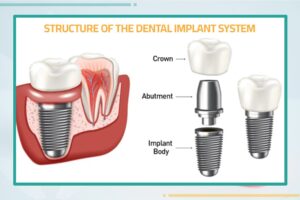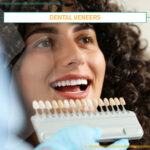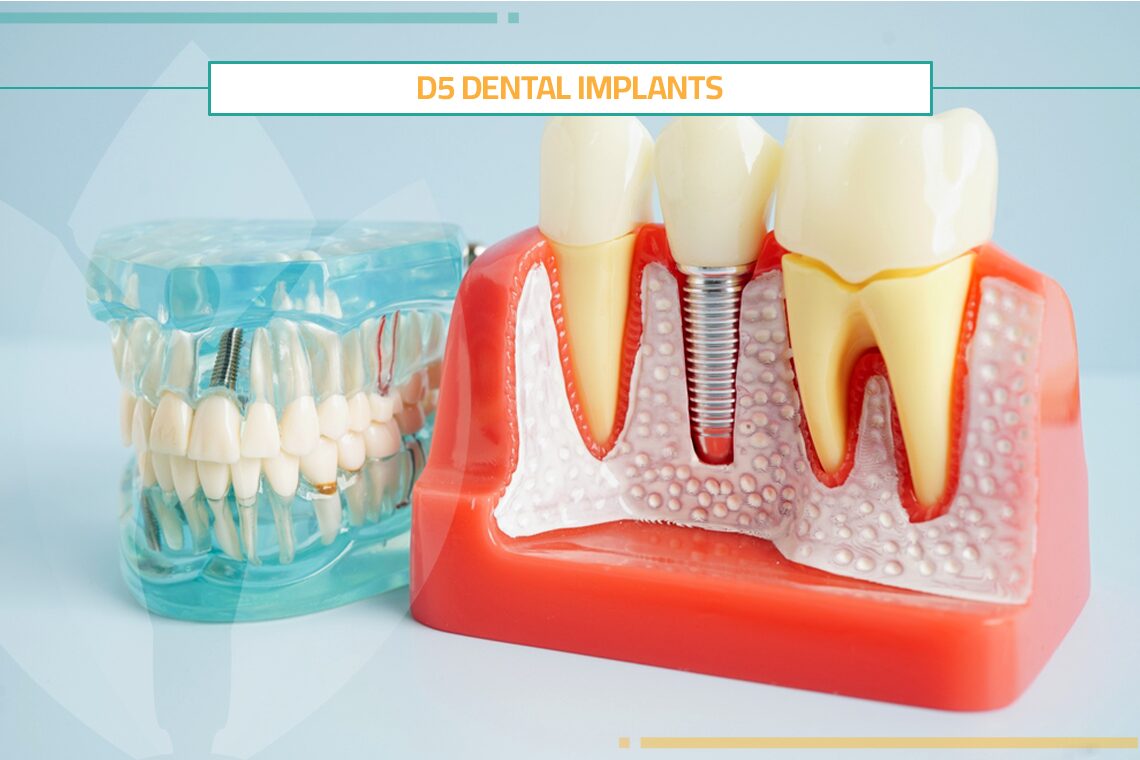D5 Dental Implants
D5 Dental Implants offer a digital solution for full arch dentistry, significantly reducing treatment time and costs. Developed over seven years, this technique allows patients to receive custom zirconia teeth in about one week with only three visits, eliminating the need for temporary dentures and extensive chair time.
D5 implants are a specific type of dental implant system designed for full arch rehabilitation. They are characterized by a streamlined process that allows patients to receive permanent zirconia teeth in a shorter timeframe compared to traditional methods. The D5 system usually involves fewer appointments, eliminating the need for temporary dentures, and integrates advanced digital technology for precise placements and custom solutions. This approach aims to enhance patient comfort, reduce treatment time and costs, and improve overall outcomes for those requiring full arch restoration.
Watch How Is Teeth Whitening Done?
How Long Does the D5 Implant Process Take?
The D5 implant process typically takes about one week to complete. Patients usually require only three visits:
- Initial Consultation: During the first visit, the dentist will evaluate the patient’s dental health and plan for the implants.
- Implant Placement: The second appointment involves placing the implants.
- Final Restoration: The final visit is when the custom zirconia teeth are fitted. This expedited timeline is designed to provide patients with a permanent solution without the need for temporary dentures and extensive chair time.
D5 Dental Implants Locations
What is included in the free consultation at Natural Beauty Turkey?
During a free consultation for D5 implants, patients can typically expect the following:
- Comprehensive Evaluation: A thorough assessment of the patient’s oral health, including examination of teeth, gums, and bone structure.
- Treatment Discussion: An overview of the D5 implant procedure, including benefits, expected outcomes, and any alternatives.
- Digital Imaging: In many cases, digital scans or X-rays may be taken to create a treatment plan tailored to the patient’s needs.
- Cost Estimate: Information on the overall cost of the procedure, payment options, and any available financing plans.
- Questions Addressed: The opportunity for patients to ask questions and express any concerns regarding the procedure.
This consultation serves as a critical step in ensuring patients are well-informed and comfortable proceeding with the D5 implant process.

Suggestions to Patients before d5 Implants
Discuss the possible advantages and disadvantages of dental implants as well as your eligibility for the treatment with your dentist before making your decision.
Considerations:
* In order to determine whether you are a good candidate for dental implants, how long the healing process will take. Plus, how long the implant may remain in place, it is crucial to consider your general health.
* For your records, find out from your dentist what brand and type of dental implant system is being utilized.
* Smoking may have an impact on the healing process and reduce the implant’s long-term success.
* You usually have a temporary abutment in place of the tooth while the implant body heals. Which could take many months or more.
Tips after Dental Implants
- Pay close attention to the oral hygiene advice that your dentist has given you. For the implant to last a long time, it is crucial to clean it and the surrounding teeth on a regular basis.
- Make an appointment with your dentist on a regular basis.
- Inform your dentist straight away if your implant hurts or seems loose.

Advantages of Dental Implant:
- Restores the capacity to chew and the appearance of the skin.
- Helps prevent bone loss from causing the jawbone to shrink.
- Maintains the surrounding bone and gums healthy.
- Enhances quality of life and helps maintain the stability of nearby teeth
What`re the Benefits of Gastroplasty?
Dental Implant Risks
- Damage to surrounding natural teeth during implant placement.
- Injury to surrounding tissues during surgery.
- Injuries during surgery, such as fracture of surrounding jawbone.
- Inadequate function, such as feeling teeth don’t bite together normally.
- Sensation of tooth loose or twisting due to abutment screw loosening.
- Implant body failure due to systemic infection, local infection, or delayed healing.
- Difficulty cleaning gums around the implant, poor oral hygiene.
- Untreated periodontal disease.
- Post-surgical numbness due to nerve impingement or damage.
- Notify healthcare providers and imaging technicians of dental implants before MRI or x-ray procedures.
Dental Implant Types
Implants come in a few varieties, each with a unique method of attachment to your jawbone.
There are two kinds:
1. Endosteal Device: The most prevalent kind is this one. It is typically inserted in your jawbone following surgery and resembles a screw, cylinder, or blade. One or more prosthetic teeth can be placed in each of these implants. For those who now wear removable dentures or bridges, this is a good alternative.
2. Subperiosteal Implant: Your prosthetic teeth are held in place by posts from a metal framework that protrudes through your gums and is positioned on top of your jaw. For those who are unable to wear removable dentures or whose jawbone is insufficient to support an endosteal implant, this is a good alternative.
Does Anyone Require Dental Implants?
Dental implants are a viable option for the majority of people who are missing one, several, or all of their teeth. You can generally be evaluated for a dental implant if you’re healthy enough to have a root canal or have a tooth extracted.
The best person to get a dental implant:
You are a perfect fit if you:
- Maintain healthy dental and general health.
- Possess a completely developed mandible.
- Possess sufficient jaw bone to support the implant or be able to receive a bone graft.
- Have periodontal disease-free, healthy gum tissue.
- Avoid any illnesses that interfere with your body’s capacity to repair broken bones.
- Avoid smoking.
- Are prepared to dedicate a number of months to the procedure.





